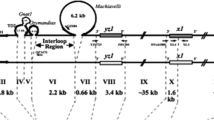Abstract
Purpose: The article is devoted to some paradigmatic features of English, Spanish, and Russian terminological units of genetics and genetic engineering when used in scientific papers and discourse.
Design/methodology/approach We studied about 600 terminological units of genetics and genetic engineering in English, Spanish and Russian (200 units in each language) and about 900 contexts of their use (300 contexts in each language). Research methods include a continuous sampling of terms, comparative analysis of terminological units and their paradigmatic features in different languages, component and definitional analysis, reconstruction of term-derivation models (in particular, morphological-syntactic and semantic models), etymological analysis, quantitative analysis, and statistical data processing.
Findings: The authors explore the synonymy, polysemy, homonymy, as well as variability and substitution of genetic terms as well as assess them from the standpoint of cognitive terminology as positive/negative in the framework of scientific communication.
Uniqueness/value: The authors come to the conclusion that synonymy in the fields of genetics and genetic engineering is a more positive phenomenon, while polysemy and homonymy have cross-industry and intersystem forms and lower the quality of communication between specialists. However, variability and substitution of terms are frequent and sometimes indispensable phenomena.
Access this chapter
Tax calculation will be finalised at checkout
Purchases are for personal use only
Similar content being viewed by others
References
Dear, P.H.: Genome Mapping (2001). https://www.researchgate.net/publication/228018214_Genome_Mapping. Accessed 20 Jan 2020
Embogama: Difference Between Genetic and Hereditary Diseases (2016). https://pediaa.com/difference-between-genetic-and-hereditary-diseases/. Accessed 20 Jan 2020
Genetic. Synonyms. Thesaurus.com (2020). https://www.thesaurus.com/browse/genetic. Accessed 15 Jan 2020
Glossary of Terms. Basic Principles of Genetics: An Introduction to Mendelian Genetics (2020). https://www2.palomar.edu/anthro/mendel/glossary.htm. Accessed 20 Jan 2020
Knapp, S.D., Knapp, S.D.: The Contemporary Thesaurus of Search Terms and Synonyms: A Guide for Natural Language Computer Searching. Oryx Press, Phoenix (2000)
Penchaszadeh, V.B.: Lingvolive.com (2020). https://www.lingvolive.com/. Accessed 20 Jan 2020
Multitran.com (2020). https://www.multitran.com/. Accessed 20 Jan 2020
NCI Dictionary of Genetics Terms. National Cancer Institute (2020). https://www.cancer.gov/publications/dictionaries/genetics-dictionary. Accessed 15 Jan 2020
NHGRI (2020). https://www.genome.gov/genetics-glossary/Contig (accessed 15 January 2020).
Penchaszadeh, V.B.: Pruebas Genéticas Predictivas. Aspectos Médicos, Eticos y Sociales. Centro Interdisciplinario de Estudios en Bioética (2000). https://www.uchile.cl/portal/investigacion/centro-interdisciplinario-de-estudios-en-bioetica/publicaciones/76988/pruebas-geneticas-predictivas-aspectos-medicos-eticos-y-sociales. Accessed 15 Jan 2020
Phillips T. Genetically modified organisms (GMOs): transgenic crops and recombinant DNA technology. Nature Education 1(1), 213 (2008). https://www.nature.com/scitable/topicpage/genetically-modified-organisms-gmos-transgenic-crops-and-732/. Accessed 15 Jan 2020
Alekseeva, A.E., Brusnigina, N.F.: Vozmozhnosti i perspektivy primenenija metodov massivnogo parallel’nogo sekvenirovanija v diagnostike i jepidemiologicheskom nadzore za infekcionnymi zabolevanijami [Possibility and perspectives of massive parallel sequencing methods in the diagnostics and epidemiological surveillance of infection diseases]. Medial 2(12), 15–28 (2014)
Alimuradov, O.A., Latu, M.N.: Osobennosti modelirovanija semantiki terminoedinic. Terminologicheskie oppozicii (na materiale anglojazychnoj voennoj terminologii. [Some aspects of modeling the semantics of terms. Terminological oppositions in the English-language military terms]. Bull. Irkutsk State Linguistic Univ. 3(11), 6–15 (2010)
Grinev, S.V.: Vvedenie v terminovedenie [Introduction to terminology science]. Moscow lyceum, Moscow (1993)
Grinev-Grinevich S.V.: Terminovedenie: ucheb. posobie dlja stud. vyssh. ucheb. Zavedenij [Terminology science: study guide for higher education students]. Moscow, Academy Publishing Center (2008)
Kondratova, M., Smirnov, I.: V poiskah nacional’nogo genotipa [Seeking the national genotype] (2019). https://biomolecula.ru/articles/v-poiskakh-natsionalnogo-genotipa. Accessed 15 Jan 2020
Kutlunina, N.A., Ermoshin, A.A.: Molekuljarno-geneticheskie metody v issledovanii rastenij: ucheb.-metod. Posobie [Molecular and genetic methods in plant research: study guide]. Yekaterinburg, Ural University Publishing House (2017)
Panchin, A.: Obygryvaja boga [Beating God]. Populjarnaja mehanika 3, 32–35 (2017)
Shukurova, T.F.: Strukturno-semanticheskij analiz terminologii genetiki v anglijskom, nemeckom i russkom jazykah: dis. ... kand. filol. nauk [Structural and semantic analysis of genetic terminology of in English, German and Russian. Ph.D. thesis]. Dushanbe (2014). 144 p.
Acknowledgments
The study was published within the framework of the project “Derivational, cognitive-semantic and discursive modeling of Russian, English and Spanish terminology in the field of genetics and genetic engineering: sources of origin, the history of development and the current state of term systems” and supported by a grant from the President of the Russian Federation (Federal State-Funded Institution of Higher Education Pyatigorsk State University, Project No. 075–15-2019–347, scientific supervisor Candidate of Science, Philology (research doctorate), Associate Professor, Senior Research Fellow A.V. Razduev).
Author information
Authors and Affiliations
Corresponding author
Editor information
Editors and Affiliations
Rights and permissions
Copyright information
© 2021 Springer Nature Switzerland AG
About this paper
Cite this paper
Razduyev, A., Mazevskaya, A., Akaeva, K., Archakov, R. (2021). Paradigmatic Relationship Between Terms in the Field of Genetics and Genetic Engineering in Modern English, Spanish and Russian. In: Popkova, E.G., Sergi, B.S. (eds) Modern Global Economic System: Evolutional Development vs. Revolutionary Leap. ISC 2019. Lecture Notes in Networks and Systems, vol 198. Springer, Cham. https://doi.org/10.1007/978-3-030-69415-9_71
Download citation
DOI: https://doi.org/10.1007/978-3-030-69415-9_71
Published:
Publisher Name: Springer, Cham
Print ISBN: 978-3-030-69414-2
Online ISBN: 978-3-030-69415-9
eBook Packages: Intelligent Technologies and RoboticsIntelligent Technologies and Robotics (R0)




